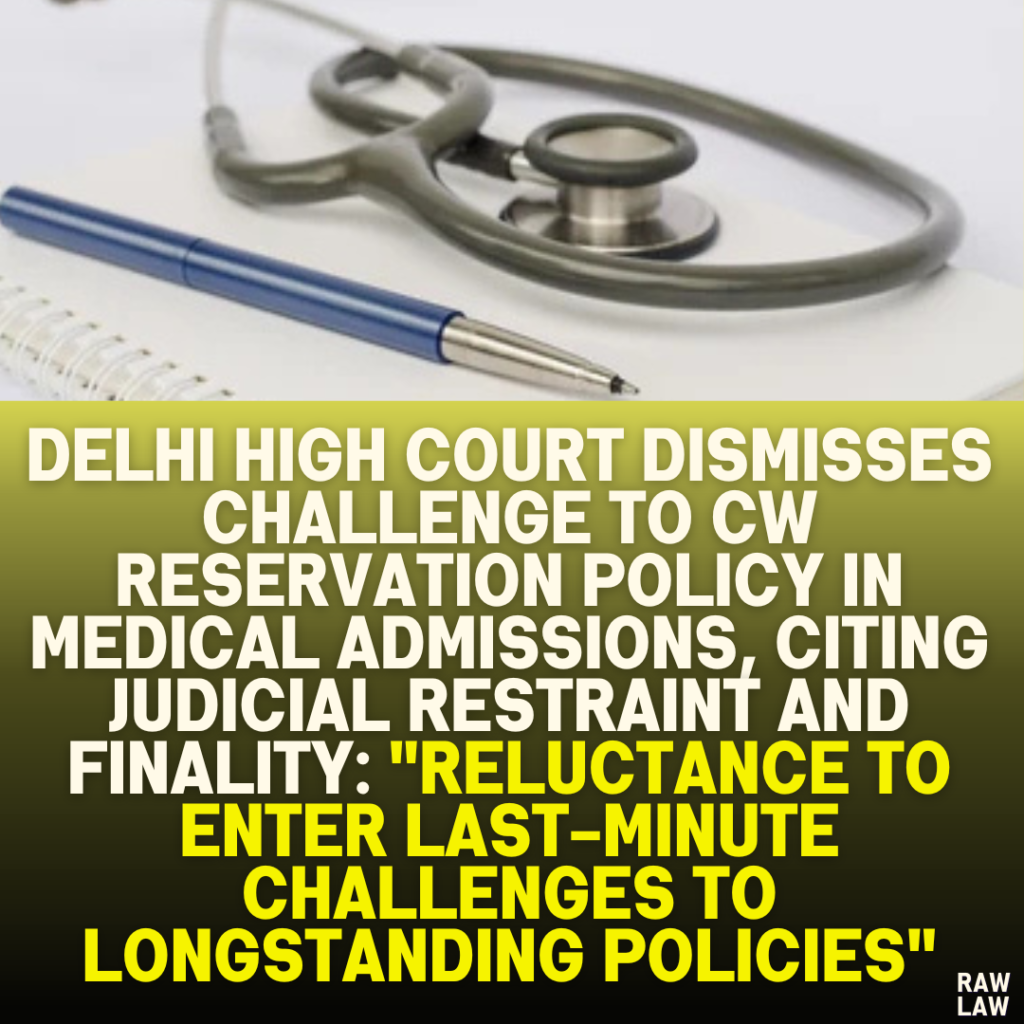Court’s Decision
The Delhi High Court dismissed the petition challenging the inclusion of Para-Military and Police Personnel wards under the Children/Widows (CW) reservation category in the University of Delhi’s undergraduate medical admissions. The court held that the reservation policy adhered to consistent guidance from both the Ministry of Defence and the Ministry of Home Affairs since 2009, making it not arbitrary and beyond judicial interference in policy matters unless there was clear illegality or unreasonableness.
Facts
The petitioner, the daughter of an Indian Air Force ex-serviceman, sought admission to the MBBS program under the CW reservation category. The University of Delhi’s Information Bulletin for MBBS admissions included both armed forces personnel and certain Para-Military and Police Personnel wards in the CW reservation. The petitioner challenged this inclusion, arguing it diluted the benefits intended solely for armed forces personnel.
Issues
- Whether the University’s inclusion of Para-Military and Police Personnel wards in the CW category violates the intended scope of the reservation policy for armed forces personnel.
- Whether the University has arbitrarily expanded the CW category by including wards of Para-Military and Police Personnel.
Petitioner’s Arguments
- The petitioner contended that CW reservations should exclusively benefit the wards of armed forces personnel as defined by the Ministry of Defence guidelines. Including Para-Military and Police Personnel wards was asserted to be outside the University’s authority and inconsistent with the intended purpose.
- The counsel argued that this inclusion of other personnel’s wards compromises the rightful reservation for eligible candidates like the petitioner.
Respondent’s Arguments
- The University argued that its reservation policy followed long-standing guidance from both the Ministry of Defence and the Ministry of Home Affairs, encompassing a broader definition of “armed forces” to include police personnel awarded for gallantry.
- The respondent asserted that the petitioner had accepted the Information Bulletin terms upon registration and was now estopped from challenging it, particularly at an advanced stage in the admission cycle.
Analysis of the Law
The court examined the policy’s compliance with instructions issued by both the Ministry of Defence and the Ministry of Home Affairs. It noted that the reservation term “CW” in the University’s policy explicitly described a broader class of personnel, consistent with the guidance provided by both ministries.
Precedent Analysis
The court referenced the Division Bench’s recent decision in Yashika Malik v. University of Delhi Faculty of Medical Science & Ors., where the inclusion of similar personnel under CW was upheld. The Division Bench allowed the admission of a candidate under CW Priority (V) based on a certificate from the Ministry of Home Affairs, affirming the validity of inter-ministerial directives in shaping reservation policies.
Court’s Reasoning
The court found that the University’s policy had evolved under clear instructions from both the Defence and Home ministries. It highlighted that inter-ministerial conflicts on policy matters do not fall within judicial purview, especially where long-standing instructions have been consistently applied. Judicial review of executive policy is limited, and the court did not find the University’s policy arbitrary or manifestly unreasonable.
Conclusion
The court concluded that the petition lacked merit, noting that the petitioner’s delay in challenging the Information Bulletin’s terms undermined the stability of the admission process. Accordingly, it dismissed the petition, underscoring the need for finality and judicial restraint in reviewing longstanding admission policies.
Implications
This ruling reinforces the principle that judicial intervention in educational reservation policies is limited and underscores the validity of inter-ministerial collaboration in shaping inclusive reservation frameworks. The decision upholds the broad definition of CW, benefiting a larger group of personnel wards, including certain Para-Military and Police Personnel with gallantry awards.




Pingback: Jammu & Kashmir High Court Affirms Right to Marry as Constitutional Liberty, Directs Police Protection for Couple Facing Familial Opposition: "Right to Liberty Includes Choosing a Life Partner Free from Societal Pressure" - Raw Law